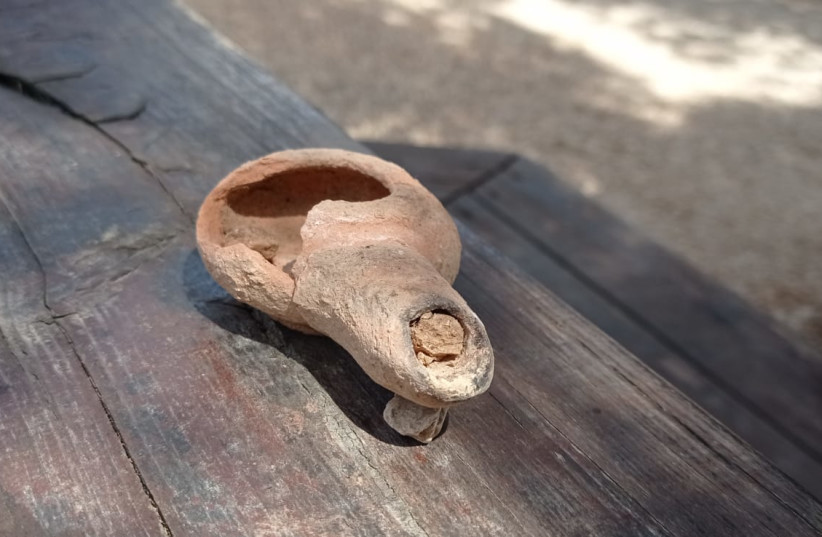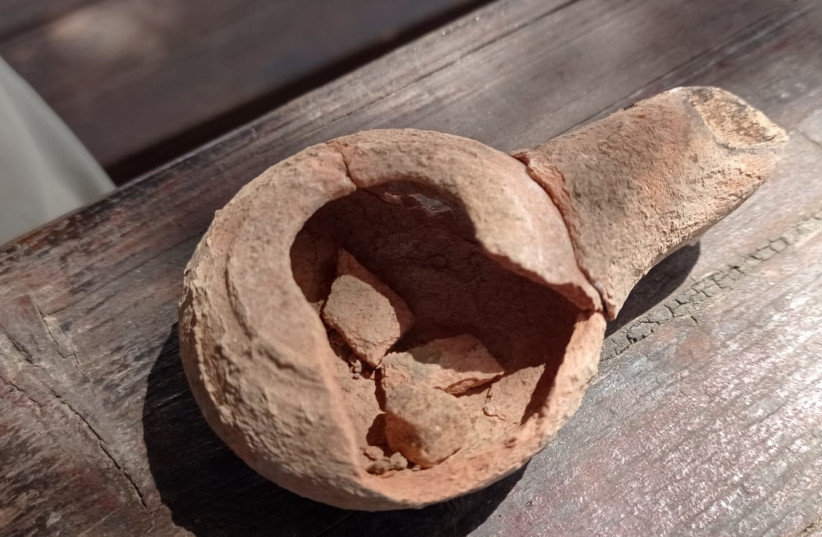The lamp was discovered while workers were clearing out an area around the stone bath from debris by hand.
By JUDITH SUDILOVSKY Published: MAY 2, 2022 17:33
Ancient Samaritan oil lap discovered during conservation work on Mount Gerizim. (photo credit: NETANEL ELIMELECH/NATURE AND PARKS AUTHORITY)
A nearly completely intact clay oil lamp from 2,300 years ago was found near a stone bath during recent conservation work at the Mount Gerizim National Park.
“It is great to find something even after all those years of excavation,” said Netanel Elimelech, director of the park run by the Israel Nature and Parks Authority. “We found a lot of clay sherds lying around, but to find something complete with signs of its use is pretty nice. You can still see the black marks of burning from when the lamp was used. It throws you back (in time.)”
The archaeological complex on Mount Gerizim, located outside of Nablus, was excavated in the 1990s under the leadership of archaeologist Dr. Yitzhak Magen. Recently conservation and accessibility work has been undertaken by the Nature and Parks Authority and the Civil Administration.
The lamp was discovered while workers were clearing out an area around the stone bath from debris by hand, said Elimelech.
“We were clearing real close to the surface and the lamp just popped out,” he said.
Ancient Samaritan oil lap discovered during conservation work on Mount Gerizim. (credit: NETANEL ELIMELECH/NATURE AND PARKS AUTHORITY)
The stone bath is believed to have been used for purification and cleansing by the Samaritans. Unlike a Jewish mikveh, the Samaritan bath is an actual element that, though heavy, can be moved.
The archaeological site on the Mount of Blessing at the top of Mount Gerizim spreads over 400 dunams. It includes remains from a large Samaritan city from the Persian-Hellenistic period which was built around a scared precinct. The precinct was surrounded by a well-fortified wall and in the center stood the Samaritan Temple. Remains of a large building containing dozens of rooms were previously excavated south of the sacred precinct. Within this structure is an olive press, a splendid residential building and shops.
The lamp, which is typical of its period, was found in the residential building. Other evidence of daily life such as plates, pots and vases, had also been previously excavated in the residence which archaeologists believe belonged to a family of wealthy priests, said Elimelech.
The Samaritans are mentioned in the Bible and view themselves as descendants of the Northern Israelite tribes of Ephraim, Menasseh and Levi, who survived the destruction of the Kingdom of Israel by the Assyrians in 722 BCE. Today members of the tiny sect who number in the hundreds live in two locations, on Mount Gerizim and in the Israeli city of Holon.
According to the Samaritan tradition, God chose Mount Gerizim for the location of the Temple, rather than Mount Moriah in Jerusalem, and it is here where God told Abraham to sacrifice Isaac.
Content retrieved from: https://www.jpost.com/archaeology/article-705674.

